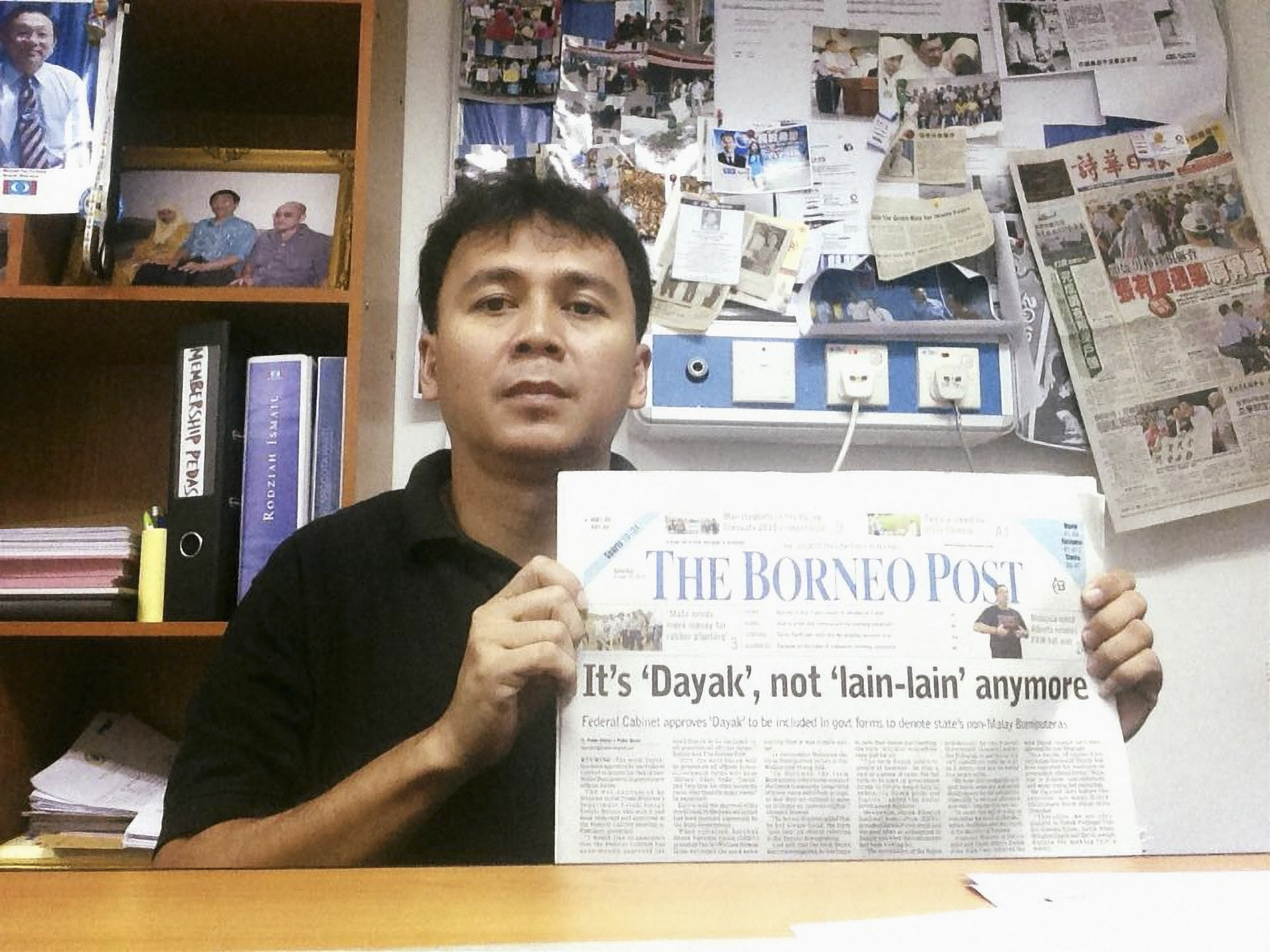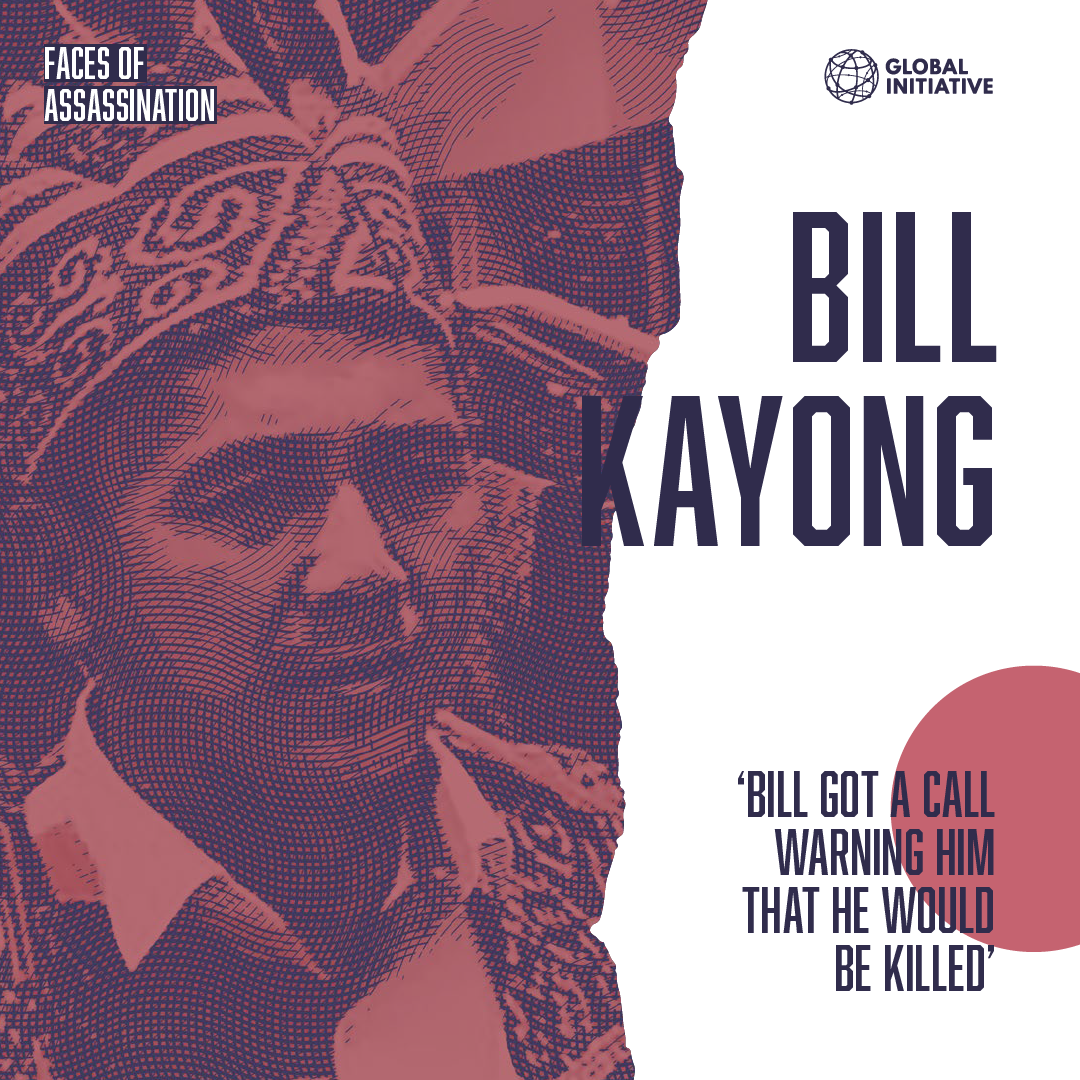21 June 2016
Sarawak, Malaysia
Bill Kayong
Profession
Community
Motive
Environmental and indigenous activism
Governance targeting


Adolfo Olivas


Ahmed Divela


Amit Jethwa


Artan Cuku


Babita Deokaran


Bayo Ohu


Berta Cáceres


Bhupendra Veera


Bill Kayong


Boris Nemtsov


Boško Buha


Chai Boonthonglek


Charl Kinnear


Chut Wutty


Chynybek Aliev


Cihan Hayirsevener


Daphne Caruana Galizia


Darío Fernández


Derk Wiersum


Deyda Hydara


Édgar Quintero


Edmore Ndou


Edwin Dagua


Federico Del Prete


Fernando Villavicencio


Gezahegn Gebremeskel


Gilles Cistac


Habibur Mondal


Igor Alexandrov


Jacob Juma


Ján Kuciak


Javier Valdez


Joannah Stutchbury


José Ángel Flores


Jules Koum Koum


Kem Ley


Luis Marroquín


Mahamudo Amurane


Marcelo Rivera


María Elena Ferral Hernández


Marielle Franco


Milan Pantić


Milan Vukelić


Muhammad Khan


Nelson García


Nihal Perera


Oliver Ivanović


Orel Sambrano


Perween Rahman


Peter R. de Vries


Rajendra Singh


Salim Kancil


Sandeep Sharma


Sikhosiphi Radebe


Slaviša Krunić


Soe Moe Tun


Victor Mabunda


Virgil Săhleanu


Wayne Lotter


Yuniol Ramírez


Zezico Guajajara
21 June 2016
Sarawak, Malaysia
Profession
Community
Motive
Environmental and indigenous activism
Governance targeting
In the Malaysian state of Sarawak, land-related tussles between local communities and large companies have been going on for decades. Stories of harassment, violence and intimidation are not new, but no one ever thought it could cost someone their life. That is until the morning of 21 June 2016, when local activist Bill Kayong was shot dead at an intersection while on his way to work.
In the town of Miri, a coastal area bordering Brunei Darussalam, locals rely on the oil and gas industry for jobs. Others, who typically belong to indigenous tribes and live on ancestral land, depend on their crops. Over the years, people like the Dayak have turned to palm oil as a source of income. With the help of external funding, they have transformed their land into small plantations. But, as time passes, one village after the other has received visits from companies laying claim to their land.
Kayong was the political secretary to Dr Michael Teo – a medical doctor who runs a private clinic and is a local parliamentarian. For years, Kayong had been supporting the Dayak people in land disputes. He had been raising awareness among various tribes, bringing people together whenever a village needed support. The case that sealed his fate, however, was a land-grab issue near Sungai Bekelit, some 60 kilometres south-west of Miri.
For nearly a decade, villagers living in the longhouse (a traditional building that is home to dozens of families) had been protesting against a local palm oil company, the Tung Huat Niah Plantation, over land ownership. The state government had given the company a provisional lease of over three hectares: a move that the villagers challenged in the Native Courts. In Sarawak, forest land is defined as state-owned and often includes areas where local communities have lived for a long time.
Kayong made repeated visits to the village, holding talks and arranging transport for villagers to attend court hearings, which are often postponed without notice. It becomes a costly exercise for villagers who undertake long journeys to defend their cases. According to Kayong’s friend and land-rights lawyer, Abun Sui Anyit, some unresolved land disputes go as far back as 15 years. Cases continue to pile up.
‘Bill was known as a hardworking, principled man. Once he decided to help others, he’d do it without hesitation,’ Anyit said. ‘He was able to mobilize the Dayaks to come out of their village and head to the city to attend court hearings. People respected him. When he called, they’d turn up.’
Kayong had a remarkable ability to bring the community together. Friends describe him as a powerful and persuasive speaker who was able to get hundreds of Dayak people to show up at rallies. Their trust was built on Kayong’s work as a mediator, connecting villagers to rights groups and lawyers to help their cases.
Teo recalled that Kayong began receiving threats a year before his murder. ‘Bill and myself both got death threats from people acquainted with Tung Huat’s director,’ said Teo.
Four men were tried for Kayong’s murder, including the plantation company director, Lee Chee Kiang. But three of the accused, including Lee, were discharged and acquitted after the prosecution failed to establish a case against them. Of the four men, only a nightclub bouncer, named Mohamad Fitri Pauzi, was convicted of murder and sentenced to death.
Teo said he received death threats after he met with Lee to discuss the land dispute at Sungai Bekelit. ‘Bill also got a call warning him that he would be killed. He got scared and took a bus back to his home town, 14 hours away from Miri,’ Teo said. ‘He hid there for two nights and I shut my clinic.’ They filed a police report, but no arrests were made. Months later, Teo was attacked with a baseball bat and suffered a collarbone fracture.
In the lead-up to Kayong’s murder, a green Toyota began to follow him. ‘Bill told me he was being followed and I told him we needed to protect ourselves,’ said Teo. The parliamentarian bought two knives, one for each of them.
For Kayong’s wife, Hasyikin Hatta, his death came out of the blue. ‘He was a quiet man at home. I rarely asked questions about his work,’ she said. Recalling that day three years ago, she said it was a morning just like any other. It was nearing Eid, and Hasyikin was preparing to make kuih, bite-sized pastries. ‘Suddenly a friend called and said: “Your husband has been shot”,’ she explained softly. ‘I thought it was a lie until I went to the scene and saw it for myself.’ Kayong died instantly from two bullets fired in the drive-by shooting.

Activist Bill Kayong holding up a local paper in the parliamentary office for a campaign in November 2015

A young Bill Kayong with his wife, Hasyikin Hatt, and their two children
Fights between villagers and company representatives have occurred countless times in longhouses. In some instances, people have died when these scuffles turned violent. ‘In the past, hired thugs would enter villages and cause disturbances,’ said Teo. But Kayong’s murder was different. This was a targeted killing using firearms.
Three years have passed and the case has been closed. However, Kayong’s friends and family say that justice has yet to be served. Teo calls the trial a sham, while Anyit says only the gunman was jailed while the mastermind remains free. They are lodging an appeal with Malaysia’s new attorney-general to reopen Kayong’s case. The initial court case was flawed from the start, Teo said, explaining that the prosecution had not called up all the witnesses and failed to draw links between the gunman and others accused.
Fitri, the gunman, also stood trial for violently assaulting the Sungai Bekelit village chief, Jambai Ali. The chief’s car was run off the road and his arm slashed with a samurai sword seven months before Kayong’s murder.
After Kayong’s killing, activism within the Dayak community faltered. Driven by fear and lacking a strong leader, locals are doubtful they would get the support needed in the fight to retain their land. ‘After his death, the Dayak community is split. No one is able to unite the Dayaks like Bill did,’ said Anyit. Teo echoes this: ‘The Dayaks fell quiet. No one is on their side: not the state government nor police.’
At least a dozen police reports have been filed by villagers in Sungai Bekelit over harassment from people described as ‘gangsters’ forcefully entering the area. To date, no arrests have been made.

'Bill got a call warning him that he would be killed'


20 July 2010
Gandhinagar, India
Amit Jethwa


15 October 2016
Mumbai, India
Bhupendra Veera


11 February 2015
Klong Sai Pattana, Thailand
Chai Boonthonglek


26 April 2012
Koh Kong, Cambodia
Chut Wutty


5 May 2004
Bishkek, Kyrgyzstan
Chynybek Aliev


20 August 2000
Dhaka, Bangladesh
Habibur Mondal


10 July 2016
Phnom Penh, Cambodia
Kem Ley


16 October 2018
Haripur, Pakistan
Muhammad Khan


5 July 2013
Deraniyagala, Sri Lanka
Nihal Perera


13 March 2013
Karachi, Pakistan
Perween Rahman


19 June 2018
India
Rajendra Singh


26 September 2015
Selok Awar-Awar, East Java, Indonesia
Salim Kancil


24 March 2018
Bhind, Madhya Pradesh, India
Sandeep Sharma


13 December 2016
Monywa, Myanmar
Soe Moe Tun